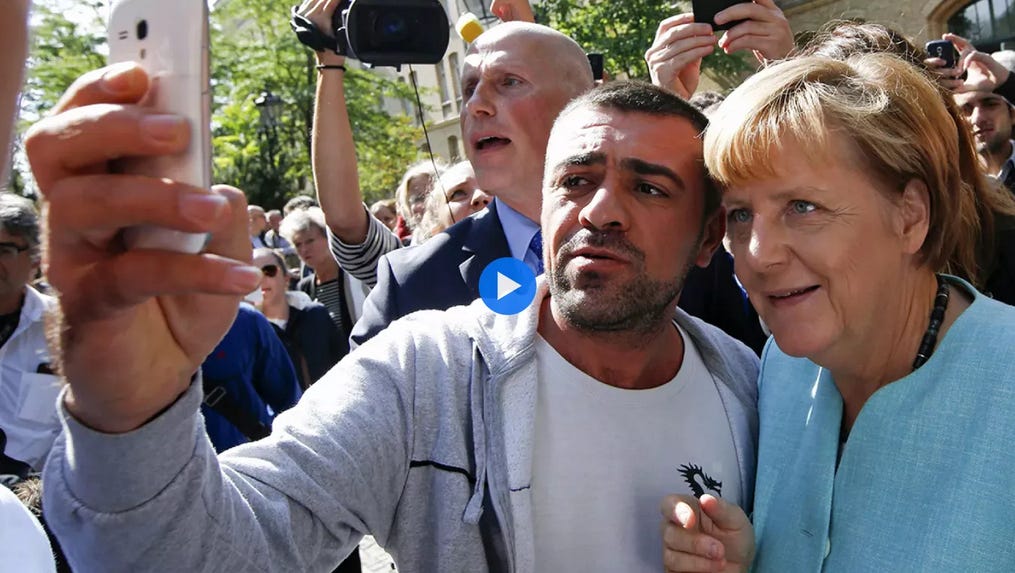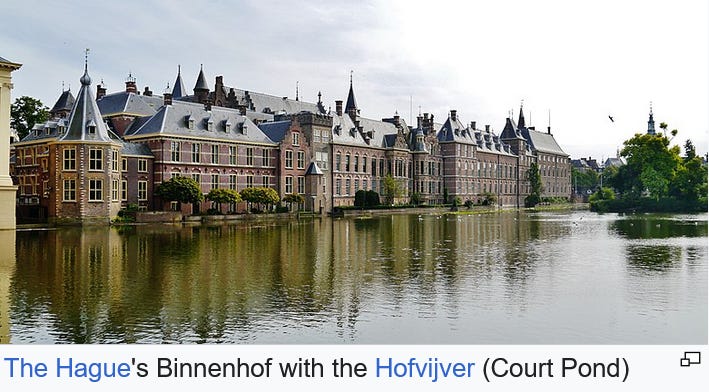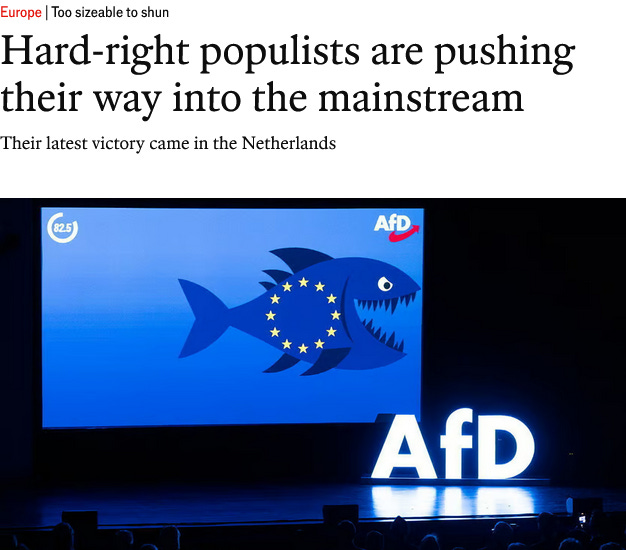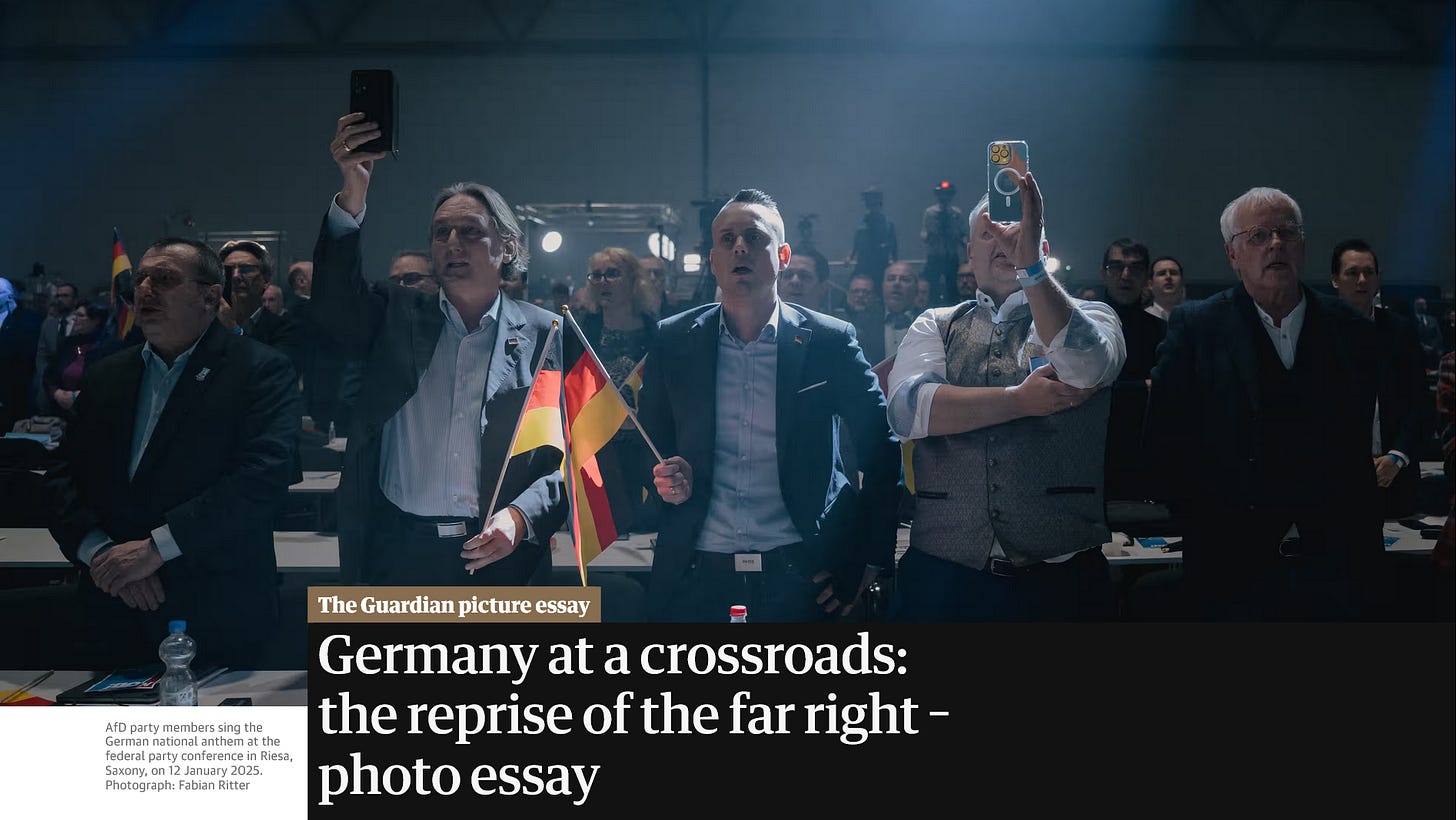Above: Geert Wilders from the PVV in the Netherlands, Alice Weidel from the AfD in Germany, and André Ventura from CHEGA in Portugal.
I think the state of things in Germany should be familiar to most of us. For those of us that aren’t, I’ll recap.
Along with France, it constitutes one of the key European powers and unifying forces behind the European Union megaproject. The pan-European experiment in liberal managerialism has long been propped up by the German regime, from the days of the America-aligned (pre-reunification) Federal Republic of Germany.
The Marshall Plan, the almost $200 billion recovery package given to Europe after World War Two played almost zero role in the continent’s recovery. So one must ask, “What was it for?” Simply put, this investment ensured political and economic alignment of postwar Europe under American hegemony. However, the postwar international order has been greatly undermined over the past decade. In Germany, this started to unfold quickly in 2015, when former Chancellor Angela Merkel made the infamous decision to personally let in one million Muslim men at the German border publicly igniting the spark the European migrant crisis—a crisis still rearing its ugly head to this day.

In the 2017 German federal election, the first following Merkel’s self-described “caesura” in her career, the Christian Democratic Union/Christian Social Union in Bavaria (CDU/CSU), saw an 8.6-point drop in votes, eliminating the gains it had received from the 2013 election. (The Social Democratic Party, SPD, the other Establishment party of Germany, experienced similar losses in the election, 85% of its parliamentary gain from the 2013 election being eliminated.)
Further, the CSU, the Bavarian constituent of the Christian Democratic Union and always tending a bit further right than the CDU, began squirming against the Establishment’s migration policy, seeking a fixed upper limit on asylum seekers, further indicating the fissures erupting in Germany’s postwar order. Another monumental shift in the 2017 election was the explosion of the “far-right” Alternative for Germany (AfD) onto the scene, having gone from nothing to instantly gaining 94 seats and nearly 6 million votes.
There was a blip in 2020, but that was experienced across the West as the transnational power elite overplayed their hand and initiated the most intensive period of thought control ever experienced in the “Free World,” what columnist Steve Sailer likes to call “the Great Awokening.” As in America, there is a corporate media which dictates the flow of information, and this was especially the case concerning the narratives spun about COVID-19. Germany has the most extensive censorship regime of any liberal European state, and there is a known habit of cooperation between state and corporate media actors. All of this combined during 2020-2021 to produce a heavily controlled and sanitized narrative concerning the government and COVID-19, and just like in America this heavily marginalized and vilified the contrarianism of right-wing politics during this period, contributing to the AfD’s poorer performance in the 2021 election. However, as even Politico admitted, the AfD after 2021 was “less fuss but still a force.”
Yet, reflecting on the wider Western world, the four-year-long mass hysteria that everyone lived through proved not to be to the benefit of the world order but to its detriment. Cost of living crises, global destabilization (namely the Ukraine and Middle East), political apathy, and of course mass migration only worsened during this time period—and all the propaganda built up in 2020 began to fall apart. The first crack in the globalist facade came in November of 2023, when the Netherlands held its elections. For years the Netherlands had been suffering from mass migration as well as European liberal managerial agricultural policies that marginalized private farmers through new regulatory regimes that benefited multinational corporations. On the 24th of November, notorious Dutch political outsider, Geert Wilders, after nearly two decades of criticizing the Dutch political Establishment from outside the Binnenhof, claimed a meteoric victory, doubling his party’s presence in the Dutch parliament.

His election was a scathing repudiation of the invasive political program of the Eurocrats, but most of the European and Western Left crossed their fingers hoping this upset wasn’t indicative of anything larger. It was.
What started in the Netherlands seemingly set off a chain reaction of right-wing populism across Europe that would turn 2024 into the worst year for Western liberal managerialism ever. A few months later, in March of 2024,the Portuguese general election dealt blows to every party in Portugal except for CHEGA, led by André Ventura, a right-wing populist often caricatured as the Portuguese Trump.” CHEGA outpaced every other party in Portugal with a gain of almost 11 points and 40 seats. As independent news outlet TLDR News EU reported, the election was a culmination of years of political disillusionment and socioeconomic struggles in Portugal, including debt, housing, and migration crises. This made two. The vibe was shifting now, and by May the Establishment media outlet The Economist reported how “Hard-right populists are pushing their way into the mainstream.”

Then came the European Parliament elections. It’s reasonable to take the EU elections as a bellwether for the continent (and many people did take it that way, especially when the results came out): right-wing populist and Eurosceptic parties outperformed their leftist counterparts across the board. About a quarter of the European Parliament would be composed of such MEPs, the largest such proportion in the supranational legislature’s history. The implications were quickly understood by the Eurocrats. Emmanuel Macron quivered in his boots as the right-wing National Rally came in first place, while his Ensemble lost 10 seats (and 1.5 million votes). He subsequently dissolved the National Assembly and called for a snap election, for reasons I still can’t precisely understand. (Most likely, Macron felt that he could sideline the results by cattle-prodding his electorate to the polls in a rush to arrest the National Rally’s momentum.)
Yet, Macron’s gambit failed. Ensemble’s share plummeted, and even though the far-left New Popular Front did come in first in absolute terms, the analysis of the National Rally’s results is telling: First, overall the National Rally claimed the most votes (10 million) and seats (53), with the NPF actually losing votes in the second round (9 mil > 7 mil) and only gaining 49 seats. Second, by age group, French youth are moving farther to the right. (In absolute and uncontextualized numbers the far-left still has the most youth behind it. However, trends matter more than static glimpses, of course.) And third, the National Rally revealed itself to be the party of the French working class (socialist politics in France is actually most popular among the managerial class), blue-collar workers being the single largest “socio-occupational classification” to back NR (57%).
Likewise, those who consider themselves “disadvantaged” and those with poor financial states both mainly supported the NR (54% and 43% respectively). Corporate media outlets would come to terms with this, reporting on the “deep discontent” taking root within the French countryside. This also tracks with the long-observed sociopolitical phenomenon of “elite secession” in France, which refers to political and corporate elites using their resources to live in gated communities and strategically pull out of involvement in those communities impacted by their policies.
Then came Britain. This election was probably the most symbolic yet. A country which had been ravaged by the mass migration, deindustrialization, and socialization of postwar European managerialism goes through a political crisis that for some reason veers leftward, yet still hosts a roiling tempest of disillusionment. All told, the only reason the Labour Party came into power was the staggering disappointment with the Conservative Party after its 14 years of rule as well as the defects in proportional representation. Labor claimed 9.7 million votes, about 500,000 less than the previous election, yet gained 211 seats. As Wikipedia explains,
Labour achieved a 174-seat simple majority, and a total of 411 seats… The party’s vote share was 33.7%, the lowest of any majority party on record, making this the least proportional general election in British history… Labour won 211 more seats than the previous general election in 2019, but half a million fewer total votes.
Only because Tory voters were so demoralized, and Labour just barely held onto the status quo, did we see these results. As The Guardian summarized it, “Conservatives plunged everywhere — but Labour failed to gain in some regions.”
The election was also plagued by low turnout, another sign of voter disillusionment: only 59.8%, which combined with the 33.7% that voted for Labour meant that only 20% of Britons actually voted for Labour. Therefore, the UK elections weren’t a victory for leftism, a turning of the tide, and this is made clear when we look at the rest of the puzzle: Reform UK (platform review here). In 2019, Reform only had 644,257 votes, but due to the implosion of the Tories and the rising tide of European populism, Reform absolutely boomed in this election, experiencing a 615% surge in their share of the popular vote. In other words, Reform was the single most popular party in this election, and continued the pan-European trend of outsider populist parties outpacing and outperforming the Establishment.
Then came Austria. Here, the Freedom Party of Austria gained a historic victory, coming in first place and, like elsewhere, outpacing and outperforming every other party in Austria. The corporate media’s response was swift and uniform, this was the “first national election win for the far-right since World War II.” US government-funded outlet Politico had a more hilariously ominous reaction: “Austria goes back to the future as voters embrace far-right party founded by Nazis.” (Ahhh!!!)
Austria still hasn’t formed a government, however, because while Austria doesn’t have nearly as pronounced of a cordon sanitaire as other European governments, the Austrian People’s Party (the deracinated Establishment right-wing party in Austria) with whom the FPÖ could form a simple majority government, doesn’t have the guts to embrace the totality of the FPÖ’s pro-Austrian, nationalist-populist platform. But the reality is clear nonetheless: Austrians want change.
All of this forms the backdrop to the 2025 German elections. Germany by no means bucked the trend we’ve observed. Suffering from mass migration, economic decline, socialist bureaucracy, a political crisis, and a complacent aging population, Germany affirmed the national-populist trend.. In 2021, the CDU/CSU lost 49 seats and took 8.8% less of the vote, a sizable loss, but in 2025 it has only recovered 25% of its lost seats. Likewise, the SDP fell drastically, eliminating all its gains and then some from the 2021 election wherein it ousted Merkel and came to power. The only parties to have substantially gained were The Left and the AfD. I suspect The Left only gained because of disaffected SDP voters who realized it was too Establishment, and thus the elections represent a realignment in German politics: away from the CDU/CSU and SDP duopoly toward an era of genuine competition between radical leftism and nationalist populism. More so, the AfD clearly was the best performing party, ending up far larger than The Left, taking the largest gains in seats and votes. A propaganda piece by The Guardian reveals the Establishment’s opinion: “Germany at a crossroads.”

They don’t like it. They’ll flood the airwaves with rhetoric about the AfD’s “disinformation” and “dehumanization,” but they’re admitting it: the status quo is over. Several consecutive elections of growth (on a state, federal, and continental level), increasing destigmatization, the complementary emergence of left-wing populism (i.e., the BSW), and other factors are all indicating that the postwar consensus in Germany, and the complementary institutions built upon it, are weakening.
While the Eurocracy dominated unchallenged, it produced a supranational Establishment in the form of EU managerialism a status quo akin to America, with carefully curated media narratives and a deracinated “opposition” (Tories, Unionists, Républicains, etc.). But all of it is beginning to come crashing down. To the list of European elections analyzed above we could also add the American election, which was similarly monumental, leading to a shockingly motivated and iconoclastic right-wing government taking power last month, but simply put what we must realize is that for over a year now national populist movements have only been strengthening across the West. They’ve come into power in only one nation thus far (America); but the fact is that, considering the political landscape of Europe since the War, the mobilization and growth of right-wing voter bases, the mainstreaming of their rhetoric, the weakening of political cordons sanitaires , and the collapse of the infamous NGO-industrial complex all ensured we’ll be living in very different times here on out. Germany is not a disappointment. It’s certainly a victory, but a victory that comes with lessons. Namely, there are three.
One: the historical absence of federalism in European nations, as in America, has left it unprotected against top-down social engineering. American federalism provides several levels of defense against federal encroachment (although, yes, that has been severely curtailed), but Europe doesn’t have that. Therefore only one institution needs to be captured to implement social engineering. Europe’s institutions were captured by managerial elites in the 1950s and 1960s, and they have been socially engineering European society ever since. As a result, the control of information in Europe is so much worse than in America, and thus Europeans have a higher level of trust in corporate media. This is why and how right-wing populism was kept marginalized for so long in Europe. But it’s a state-sponsored information cartel that’s beginning to crumble, especially as the rise of social media contributes to the proliferation of independent outlets, and will start to have the same narrative-breaking impact the Internet and podcasts had on the American election.
Two: Boomer politics hinders genuine political progress, the sociology of which has been explained by YouTuber and demographics scholar Kaiser Bauch as coming down to the more complacent and passive attitude of elderly voters, who’ve already saved up money and will not be phased by the long-term losses of short-term gains (since they expect to be dead by then).
In Germany, most voters for the Establishment parties were pensioners, whereas workers voted more for the AfD. Breaking the spell of Boomer politics will be a significant factor for continued political transformation in the future.
Third and finally, playing the long game is far more effective. American nationalists have been trying to fight the system through the system, such as Pat Buchanan, who ran a serious campaign in 1992 and 1996, but ultimately got sidelined by the corporate media and Establishment. Third party candidates have constantly bemoaned FCC guidelines, electoral thresholds, and other rules, and have rightly pointed out that the system seems biased against their success. However, what European nationalists realized from early on, under the guidance of leading groups such as the French Think Tank GRECE, is that you can never win that game of “heads I win, tails you lose.” Through the pursuit of “metapolitics,” which as outlined by the theorist Guillaume Faye is the endeavor to gain cultural power before political power, promoting national-populist communities, institutions, art, literature, and other media to affect public opinion through channels that were the European nationalists’ own or were unencumbered by Establishment control, and thus were able to entirely circumvent the firewalls of the Eurocrats, only needing the catalyst of the 2015 migrant crisis to propel their ideas forward. As a 2011 study published by Physical Review E detailed, social consensus change can be significantly influenced by a committed minority of 10%, and since the 1980s the French far-right has consistently enjoyed ≥10% of the vote—see the typical vote for Jean-Marie Le Pen’s former National Front and others.
Now that the European public is culturally ready to receive their message, European nationalists are reaping bounties across the continent, leading to a sudden transformation the Eurocrats didn’t see coming (because all they bothered to notice were the European nationalists withdrawing from their rigged games). Metapolitics is a powerful and prudent tool, and should always be used by nationalist movements, both as a means of building soft power, and then maintaining it if a nationalist government is established and has a sufficient mandate to accomplish systemic electoral reform (much like Trump is endeavoring to do in America).
In conclusion, I’m not about to say that given another election cycle or two Europe will erupt with right-wing governments. (I never like making long-term assessments in that manner unless the reasoning is absolutely certain.)
While it would seem very odd for this unbroken streak of European nationalist triumphs to slow or stop, the impact of what has happened, not will, is far greater. What has happened is that the uniformity and integrity of a carefully crafted political system has buckled, and in America it has nearly collapsed entirely if we don’t underestimate just how influential the now-gutted NGO-industrial complex is, which will reflect back on Europe before long.
J.D. Vance has already said as much, using his platform at the Munich Security Conference to warn Eurocrats that America’s soft power will no longer be used to maintain information firewalls and political quarantines. The response of German defense minister Boris Pistorius to Vance’s comments, “That is unacceptable,” reflect both the mentality of the Eurocracy and the irony of the German situation in hindsight: the Eurocrats think their regime holds water still, but it’s quickly draining out of a thousand pinpricks made by the pressure of the new American regime and their own domestic dissidence. A nationalist government doesn’t need to get into office in the next two, five, or even ten years in Europe. All that needs to happen, and is happening, is that the Establishments of Europe are pushed further and further to the edge by the rising tide of national populism.
There is no going back to where we were just two years ago, that’s for sure.
